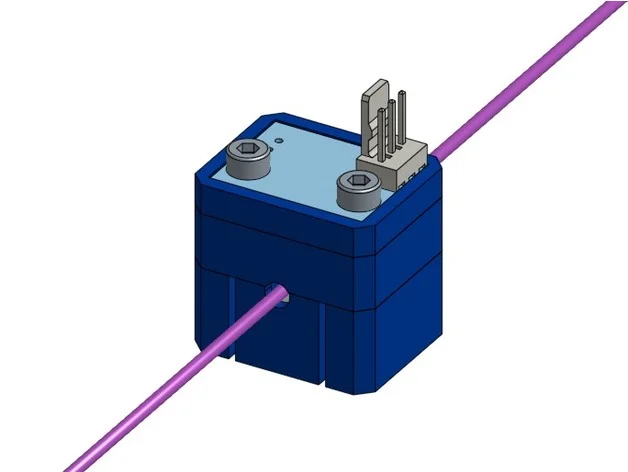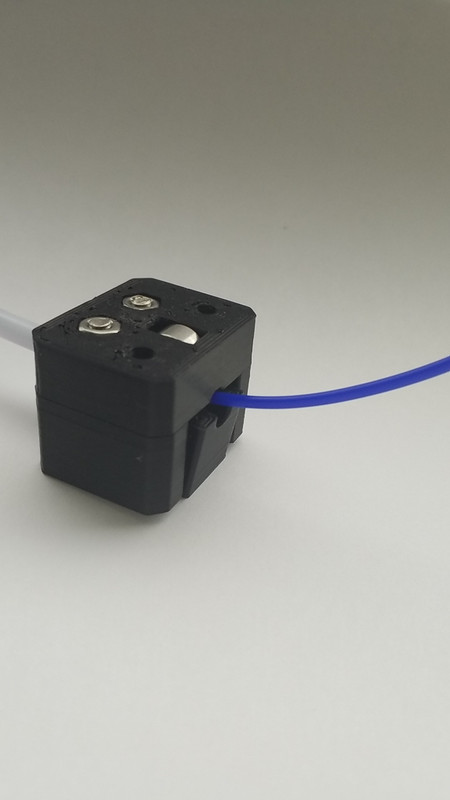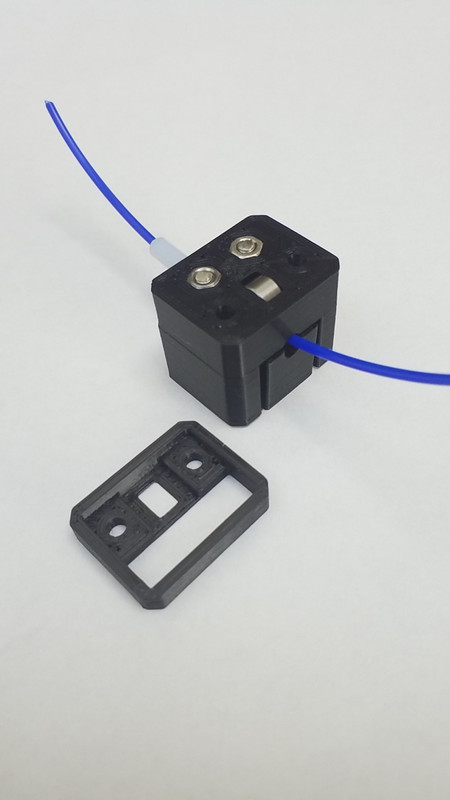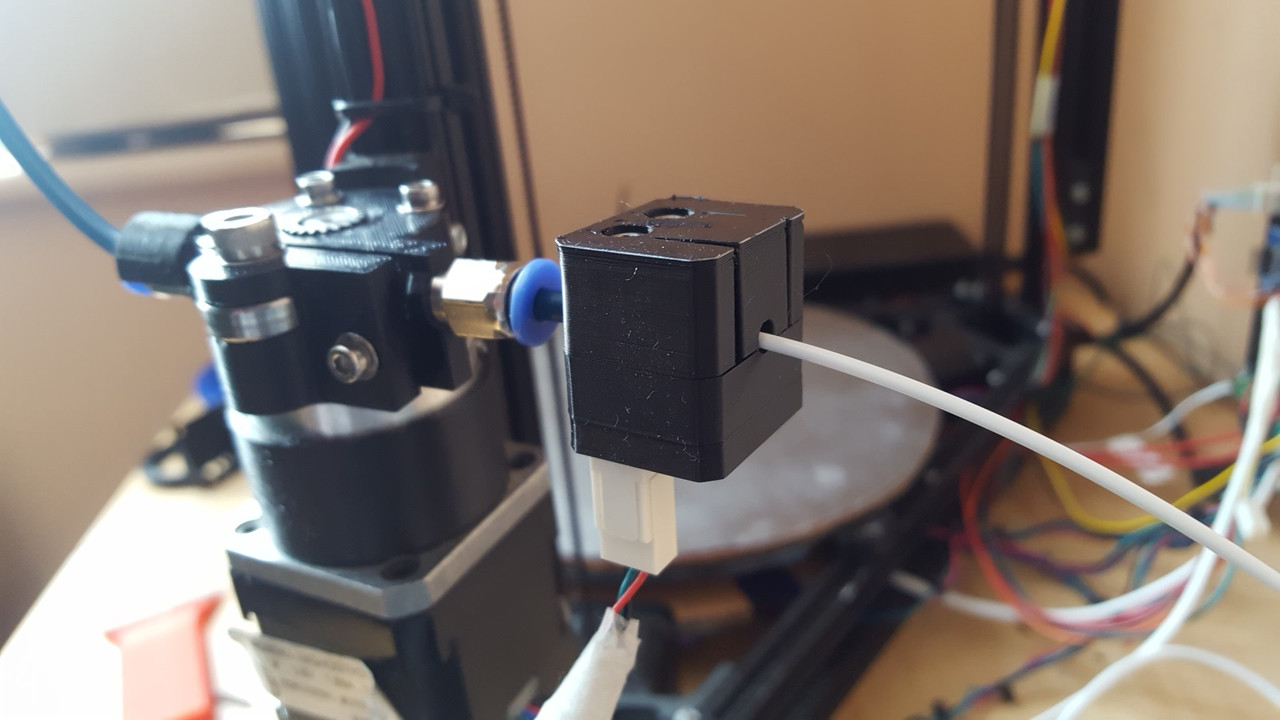Indirect (bearing) laser filament monitor concept
-
I'll release the current design for those who have a 693ZZ bearing at hand and want to test and redesign it for the F623ZZ bearings that I have spares.
-
@brunofporto said in Indirect (bearing) laser filament monitor concept:
Finish printing... And realized that I lost my small bearings.....
I stored at some safe place to not lose it and now I do not remember where

What the heck are you doing in my house??!??

This is great thinking outside the box (well, maybe INSIDE the box).
LOVE THIS!
Don't have that sensor, but if this works it gives me a reason to have one. Well done.
-
If you have the Duet3D LAser Filament Monitor and a pair of 693ZZ bearings here is the prototype.
https://www.thingiverse.com/thing:3558691

I'll redesign it for the F623ZZ

-
@puterpro Pretty sure I'll find them when they are not needed anymore


-
Have done a test print of the 693zz version in pla.

As you can see, the jaw tends to drop somewhat when the filament goes through. Do you think it needs some extra support? - maybe a plate that goes on the bottom? Or perhaps it would be better in petg? For my printing, I think the 4mm slots for the bearings could do with a tiny bit more tolerance. Great idea though - I am about to order a laser monitor on the strength of it. -
this looks very good

do you have any tests to show the difference?
 might put this on my printer if its actually working good
might put this on my printer if its actually working good 
-
@adrian52 It was supposed to work like that!
 The spring is integrated.
The spring is integrated.Does it deform permanently or it comes back nicely to the original position? When you pull the filament can you see the bearings moving?
-
@johnjohn1990 Still not tested... I lost my bearings and now I am designing for the F623ZZ that I have here.
-
I wonder... how much work would it be to give this a go with the 608ZZ?
-
@brunofporto the bearing moves ok, but it feels like the jaw is having to move too far, overstretching a little past the point where it would spring back strongly.
-
@adrian52 Thanks!
-
@brunofporto realised later that one of the bearings was not fully seated, so your bearing gap may well be right. Still need a bit of tolerance for the outer part of the bearing, and I suspect that the jaw spring may need to be a bit thicker. Will try again - thanks for the design.
-
Those changes seem to work OK

I used 0.1mm gap on each side of the bearings, and added 1mm to the base of the jaw to make the spring stronger. I didn't have room for washers, but the bearings rotate quite freely. -
@brunofporto How is the sensor working out for everyone after this modification?
-
Thank you for sharing with us.
I have a magnetic sensor from about 1 year and it works flawlessly.
I don't know if laser costs less of magnetic, but the need of a bearing system in the laser sensor affect the simplicity of this device reducing or annulling the advantages over the magnetic one.
IMHO
.
good idea anyway -
I haven't really tested it yet after the initial test runs.
In my case, the range was always between 1% and 25%. So not really usable. I have loads of the 693ZZ now, so can experiment. I'll try to paint it over with a sharpie and see what that will do.
Another thing is that I had to enlarge the cutout for the bearing. My bearing is exactly 4mm and the gap is the same. There's no way washers will fit in there along with the bearing. -
@pkos We can test some bearing surface coverings and treatments - like heat shrink tube of a way to make the surface of the bearing rough.
-
@brunofporto I finally got a sensor, and have fitted it. It seems to be working OK, although giving high percentages - 103 minimum, 147 average, 203 max, on a roughly 3000mm print. I have made the following changes to the design
- The cutout for the board components needed an extra 1mm - maybe because I have the v2 sensor?
- The jaw bearing is lowered by 0.3mm. The hinge only bends a little, but enough to grip the filament
- The ptfe tube slot is widened to 4mm diameter. I was finding the filament was sticking because of compression of the tube. I also made 3 narrow cutouts 4.2 mm diameter in the slot to make the inside ridged - the tube seems to hold quite firmly without occluding the bore
- I think I already mentioned giving 0.1mm clearance for the bearings, and 1mm extra for the hinge
- I roughened the outside of the upper bearing with an emery board - feels a bit more grippy, and maybe seen better by the sensor?
this is what it looks like

I could post my changes on thingiverse, but didn't want to steal your thunder
Will update as I get more experience with it.
-
@adrian52 said in Indirect (bearing) laser filament monitor concept:
I finally got a sensor, and have fitted it. It seems to be working OK, although giving high percentages - 103 minimum, 147 average, 203 max, on a roughly 3000mm print. I have made the following changes to the design
I think you have the new version laser filament monitor, that's why the movement percentages are so high. Firmware versions 2.03beta and 3.0beta recognise the newer version and give the correct percentages.
-
@dc42 I'm actually on 2.03beta3 (2019-03-25b6)